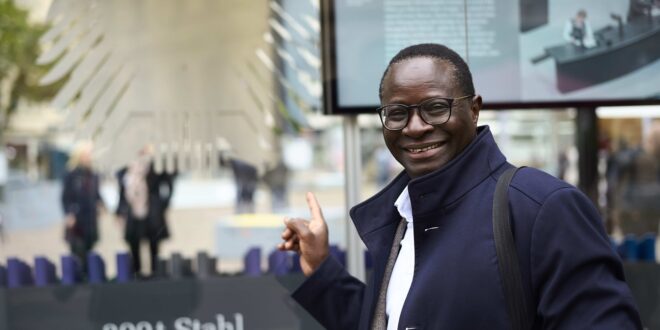On 23 February, German voters will choose a new government. Reducing immigration has emerged as the main issue in the current election campaign due to recent deadly terror acts that involved suspects with immigrant origins.
Several parties have adopted the tough stances of the far-right Alternative für Deutschland (AfD) on immigration in an attempt to tap into the perceived potential of the issue to win votes.
For voters of African descent and other migrant communities, participating in this election is crucial as its outcome could threaten their rights as well as the values of diversity and inclusion in Germany. More than seven million people with a migration background are eligible to vote in the Bundestag election, making up 12% of the electorate.
This guide explains how Germany’s electoral system works, the parties involved in the upcoming election and why your vote on 23 February 2025 is more important than ever.
![]()
Why this Election is Critical
The AfD, a far-right party known for its anti-immigrant policies, is gaining support and poses a serious threat to the rights and dignity of people of migrant origin. Unfortunately, some of the mainstream parties have also adopted some of the positions of the AfD on immigration.
If anti-immigrant parties achieve overwhelming success in the upcoming election, they would have the numbers in the parliament to make laws and policies detrimental to minority communities, including African and other immigrant populations.
Therefore, it is essential for all eligible voters, especially those from migrant backgrounds, to turn out in large numbers and use their vote to defend their rights, democracy and an inclusive society.
![]()
Who Can Vote in Germany?
Not everyone residing in Germany is eligible to vote. The right to vote depends on your citizenship and the type of election:
- Federal and State Elections: Only German citizens aged 18 and above can vote to elect members of the Bundestag (federal parliament) and the Landtag (state parliament).
- Local Elections: German citizens and Citizens of the European Union living in Germany can vote in city or municipal elections.
- European Parliament Elections: German citizens and EU citizens residing in Germany can vote for their representatives in the European Parliament.
If you are not a German citizen, you cannot vote on 23 February. However, you can still engage by encouraging others to vote and raising awareness within your community.
![]()
How the Voting System Works
Germany employs an electoral system that unites the principles of majority rule and proportional representation.
Each voter has two votes:
- First Vote (Erststimme): This is for a candidate in your district. The candidate with the most votes secures a seat in parliament.
- Second Vote (Zweitstimme): This is for a political party. This vote determines the proportion of seats each party receives in the Bundestag.
The second vote is particularly significant as it decides which parties hold the most power in parliament. Voting for parties that support migrant rights is a powerful way to defend your rights and stand against discrimination.
First and second ballots do not have to be cast for the same party. Voters are free to cast ballots for someone from one party with their first ballot and for a completely different party with their second.
A political party must secure at least 5% of the national vote to gain seats in the Bundestag. If it falls below this threshold, it does not receive proportional representation, except in cases where it wins at least three direct mandates (constituency seats). This rule helps prevent political fragmentation by limiting the influence of very small parties and promoting stable governance.
![]()
Parties Participating in the 23 February 2025 Election
A total of 29 parties have qualified to compete in the election, but only nine will appear on ballots nationwide. Of these, seven have a realistic chance of entering the Bundestag, according to most opinion polls. Understanding their positions, especially on immigration and inclusion, can help you make an informed decision.
- Christian Democratic Union/Christian Social Union (CDU/CSU): A centre-right alliance led by Friedrich Merz, focusing on market-oriented economic reforms, internal security and traditional values. Although they are not as radical as the AfD, they take a tough position on immigration. The CDU/CSU supports skilled immigration to address labour shortages, but they emphasize that migration must be regulated and tied to Germany’s economic needs.
- Social Democratic Party (SPD): A centre-left party led by Olaf Scholz, emphasizing social welfare, economic incentives and infrastructure modernization. The immediate past SPD-Greens-FDP coalition government led by Scholz has been praised for its progressive, forward-thinking immigration and integration policies. These include new laws that facilitate the immigration of skilled workers from non-EU nations, a more liberal naturalization law that permits dual citizenship and the Opportunity Residence Act (“Chancenaufenthaltsgesetz”), which offers the possibility of regularizing the residency status of rejected asylum-seekers. Additionally, the coalition gave refugees, regardless of their status, more unrestricted access to integrating programs.
- Alliance 90/The Greens: An environmentalist party with Robert Habeck as the candidate, advocating for climate protection, renewable energy expansion and progressive social policies. The party has a pro-immigration stance and advocates for policies that support immigrants and refugees. Their approach emphasizes humanitarian protection, integration, anti-discrimination and inclusion.
- Free Democratic Party (FDP): A liberal party led by Christian Lindner, promoting free-market policies, tax cuts and digital innovation. The party supports skilled immigration but has recently adopted a hardline on asylum seekers and irregular migration. The Free Democrats are however more liberal than the CDU/CSU on immigration.
- Alternative für Deutschland (AfD): Alice Weidel is the candidate of this far-right party, which is well-known for its nationalist ideas and anti-immigration stance. The party not only advocates against immigration but also for remigration, which means the return of migrants living in Germany to their countries of origin. The AfD opposes state-funded integration programs, arguing that migrants should fully adapt to German culture or leave. Their approach aligns with far-right populist movements in Europe, such as Marine Le Pen’s National Rally in France or Viktor Orbán’s Fidesz party in Hungary.
- The Left (Die Linke): A far-left party focusing on income equality and social justice. The party has one of the most pro-immigration and refugee-friendly positions in German politics. Their approach is rooted in human rights, social justice and anti-discrimination.
- Sahra Wagenknecht Alliance (BSW): A new party led by Sahra Wagenknecht, a former leader of the Die Linke, emphasizing left-wing economic policies and cultural conservatism. While it calls for progressive social welfare policies the party also advocates a hardline on migration. While BSW shares some social justice positions with Die Linke, it takes a much more restrictive stance on migration, aligning with the position of the CDU/CSU.
The German electoral system is designed to produce coalition governments. Hence, the party with the most representatives in the Bundestag attempts to build a governing coalition. Such coalitions should hold a parliamentary majority, with the party having the most MPs in a ruling coalition appointing its chancellor candidate to lead the government.
The 2021 election resulted in a three-way coalition between the SPD, the Greens and the FDP. The collapse of that coalition in November 2024 triggered the 23 February election.
![]()
How to Vote in the 23 February 2025 Election
If you are eligible to vote, you will have received a voter notification (Wahlbenachrichtigung) by now. This document provides:
- The date and location of your polling station.
- Instructions on applying for postal voting (Briefwahl) if you cannot vote in person.
On election day, bring your voter notification and a valid ID, such as a passport or national identity card (Ausweis) to the polling station.
![]()
Why Your Vote Matters
More than seven million people with a migration background are eligible to vote in the Bundestag elections, accounting for 12% of the electorate.
According to an analysis by the Federal Statistical Office, among the 7.1 million eligible voters with a migration background:
- ~2 million have roots in EU countries
- ~1 million have a migration background from Turkey
- ~2.3 million have a post-Soviet migration history, primarily ethnic German repatriates and their descendants
- 2.09 million have roots in Asia, including 1 million post-Soviet voters with ties to Kazakhstan
- 308,000 have a migration background from African countries
- 175,000 have origins in North and South America
By voting, you:
- Protect Your Rights: A high turnout from communities of migrant origin can prevent anti-immigration parties from gaining overwhelming power and threatening your rights.
- Shape the Future: Your vote influences policies on immigration, education, housing and social welfare.
- Defend Democracy: Voting upholds the values of freedom, equality and inclusion.
The 23 February 2025 election is not just about politics — it is about safeguarding the dignity and future of all who call Germany home. By turning out in large numbers, especially from African and migrant communities, you can make a significant impact.
Your vote is your voice; use it to defend your rights and stand for an inclusive Germany.
Femi Awoniyi
 THE AFRICAN COURIER. Reporting Africa and its Diaspora! The African Courier is an international magazine published in Germany to report on Africa and the Diaspora African experience. The first issue of the bimonthly magazine appeared on the newsstands on 15 February 1998. The African Courier is a communication forum for European-African political, economic and cultural exchanges, and a voice for Africa in Europe.
THE AFRICAN COURIER. Reporting Africa and its Diaspora! The African Courier is an international magazine published in Germany to report on Africa and the Diaspora African experience. The first issue of the bimonthly magazine appeared on the newsstands on 15 February 1998. The African Courier is a communication forum for European-African political, economic and cultural exchanges, and a voice for Africa in Europe.


































